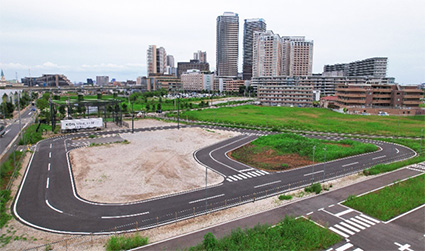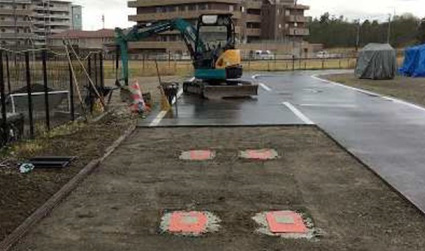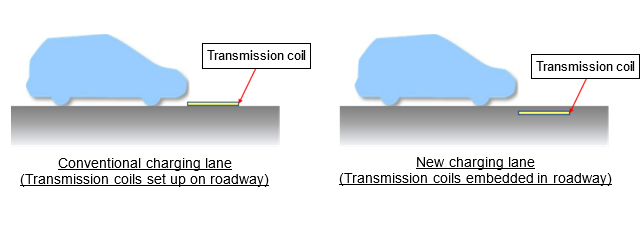First Private-Sector Lane Embedded with Power Transmission Coils for Charging Vehicles While Traveling Established at KOIL MOBILITY FIELD
-Road-Embedded Power Transmission Coils Installed to Draw Closer to Japan’s First Demonstration Experiment on Public Roads-
Juy 3, 2023
Graduate School of Frontier Sciences, The University of Tokyo
Mitsui Fudosan Co., Ltd.
Tokyo, Japan, July 3, 2023 – The H. Fujimoto & O. Shimizu Research Lab at The University of Tokyo’s Graduate School of Frontier Sciences (the “University of Tokyo”) and Mitsui Fudosan Co., Ltd., a leading global real estate company headquartered in Tokyo, announced today that they have established a lane that charges electric vehicles as they are traveling at KOIL MOBILITY FIELD*1, an outdoor robot development and testing site, one of the largest in greater Tokyo, and have commenced a field verification experiment. This was the first time such a lane has been established by the private sector. The University of Tokyo and Mitsui Fudosan are drawing closer to conducting a demonstration experiment of wireless power transfer to electric vehicles as they travel on public roads, which will also be the first experiment of its kind in Japan. Companies, universities and other institutions involved in research and development on wireless power transfer to vehicles will be able to use the lane by partnering with the University of Tokyo for joint research and becoming a member of KOIL MOBILITY FIELD.

KOIL MOBILITY FIELD

Embedding the power transmission coils
The University of Tokyo and Mitsui Fudosan have conducted research and development with a view to making wireless power transfer practically viable as soon as possible through joint research using KOIL MOBILITY FIELD. In order to accelerate this research and development, a wireless power transfer lane was established that charges electric vehicles as they are moving. The new lane is embedded with power transmission coils made by SWCC Corporation that are compliant with requirements for road construction, surface temperature and other environmental conditions making it closer to the type of lane that would actually be used in society.

With the new embedded transmission coils, it is estimated that charging for 60 seconds will allow a vehicle to travel for around six kilometers. Considering how the coils will be used in society, in the city, it will be effective to embed them within around 30 meters of the stop lines at intersections where cars wait for the signal to change. If in the future it becomes possible to establish infrastructure and conduct urban development such that vehicles can charge for 60 seconds every six kilometers of travel, the vehicles would be continuously charged and would not need to park and use specified charging facilities. Also, their battery’s net power consumption would be zero, so continuous travel would be possible using just a small battery.
The results of this research project using the new wireless power transfer lane are scheduled to be presented at the 2023 IEEE Third International Conference on Industrial Electronics for Sustainable Energy Systems.
The University of Tokyo is promoting the “Future society opened by direct dynamic wireless power transfer to EV”, a research project that is part of the JST-Mirai Program of the Japan Science and Technology Agency (JST) for the practical viability of wireless power transfer to electric vehicles as they travel.
The project was proposed by Prof. Hiroshi Fujimoto and his research group at the University of Tokyo to create an innovative technology based on a completely novel concept and science in order to build a low-carbon society that limits emission of carbon dioxide (CO2), and it was adopted by the JST in October 2017 as a feasibility study in the “Low Carbon Society” mission area. Partnering with Mitsui Fudosan as its joint research institution, the project is planning a demonstration experiment in fiscal 2023 of wireless power transmission to vehicles traveling on public roads in the Kashiwa-no-ha area. It will be the first experiment of its kind in Japan.
CO2 emissions from vehicles climbed to 15.1% (160.66 million tons)*2 of Japan’s total CO2 emissions in fiscal 2021 (1,064.00 million tons) and, in Europe, more strict regulations limiting CO2 emissions related to vehicles are expected going forward. In light of these trends, automakers around the world are promoting the development and spread of vehicle electrification, but there are concerns about batteries being in short supply in the near future. This project is conducting technology development that will make it possible for electric vehicles to secure a cruising distance with a smaller battery load by being charged directly from the road while in motion or stopped. The potential benefits include the following.
- Lower vehicle prices due to smaller, lighter batteries
- Improved fuel economy (electricity cost) due to lighter batteries
- Reduced travel time when including charging time
- Reduced CO2 from battery production due to lower battery capacity
The University of Tokyo and Mitsui Fudosan will contribute to the realization of a sustainable mobility society by promoting this research and development with the aim of conducting a demonstration experiment of wireless power transfer to electric vehicles as they travel on public roads.
- 1 Refer to Mitsui Fudosan’s website: “Among the Tokyo Metropolitan Area’s Largest Outdoor Robot Development and Verification Bases / Use of KOIL MOBILITY FIELD Starts in June 2021 / Accelerating New Industrial Creation in Kashiwa-no-ha Smart City”
https://www.mitsuifudosan.co.jp/english/corporate/news/2021/0610_01/download/20210610_01.pdf - 2 Source: Website of the Ministry of Land, Infrastructure, Transport and Tourism (updated May 17, 2023)
https://www.mlit.go.jp/sogoseisaku/environment/sosei_environment_tk_000007.html (Japanese only)
■Mitsui Fudosan Group’s Initiatives for SDGs
https://www.mitsuifudosan.co.jp/english/esg_csr/
The Mitsui Fudosan Group aims for a society that enriches both people and the planet under the principles of coexist in harmony with society, link diverse values and achieve a sustainable society, and advances business with an awareness of the environment (E), society (S) and governance (G), thus promoting ESG management. By further accelerating its ESG management, the Group will realize Society 5.0, which the Japanese government has been advocating, and contribute significantly to achieving the SDGs. Additionally, the Group formulated the following Group guidelines related to “Realize a Decarbonized Society” and “Diversity & Inclusion Promotion” in November 2021, and “Biodiversity” in March 2023. The Mitsui Fudosan Group will continue to work toward solving social issues through neighborhood creation.
[References]
・Group Action Plan to Realize a Decarbonized Society
https://www.mitsuifudosan.co.jp/english/corporate/news/2021/1124/
・Formulated Diversity and Inclusion Promotion Declaration and Initiatives Policy
https://www.mitsuifudosan.co.jp/english/corporate/news/2021/1129_02/
・Mitsui Fudosan Group Biodiversity Policy
https://www.mitsuifudosan.co.jp/english/corporate/news/2023/0413/
* The initiatives covered in this press release are contributing to four of the UN’s SDGs.
| Goal 8 | Decent Work and Economic Growth |
|---|---|
| Goal 9 | Industry, Innovation and Infrastructure |
| Goal 11 | Sustainable Cities and Communities |
| Goal 17 | Partnerships for the Goals |



























